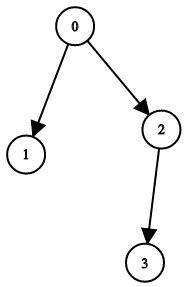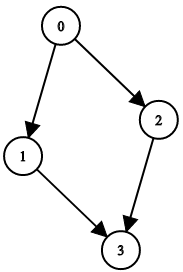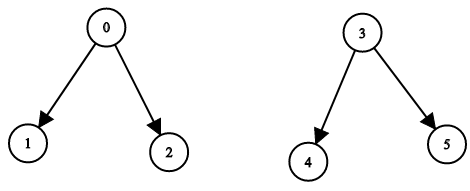You have n binary tree nodes numbered from 0 to n - 1 where node i has two children leftChild[i] and rightChild[i], return true if and only if all the given nodes form exactly one valid binary tree.
If node i has no left child then leftChild[i] will equal -1, similarly for the right child.
Note that the nodes have no values and that we only use the node numbers in this problem.
Example 1:
Input: n = 4, leftChild = [1,-1,3,-1], rightChild = [2,-1,-1,-1] Output: true
Example 2:
Input: n = 4, leftChild = [1,-1,3,-1], rightChild = [2,3,-1,-1] Output: false
Example 3:
Input: n = 2, leftChild = [1,0], rightChild = [-1,-1] Output: false
Example 4:
Input: n = 6, leftChild = [1,-1,-1,4,-1,-1], rightChild = [2,-1,-1,5,-1,-1] Output: false
Constraints:
1 <= n <= 104leftChild.length == rightChild.length == n-1 <= leftChild[i], rightChild[i] <= n - 1
Union find.
class Solution:
def validateBinaryTreeNodes(self, n: int, leftChild: List[int], rightChild: List[int]) -> bool:
p = list(range(n))
vis = [False] * n
def find(x):
if p[x] != x:
p[x] = find(p[x])
return p[x]
for i in range(n):
l, r = leftChild[i], rightChild[i]
if l != -1:
if vis[l] or find(i) == find(l):
return False
p[find(i)] = find(l)
vis[l] = True
n -= 1
if r != -1:
if vis[r] or find(i) == find(r):
return False
p[find(i)] = find(r)
vis[r] = True
n -= 1
return n == 1class Solution {
private int[] p;
public boolean validateBinaryTreeNodes(int n, int[] leftChild, int[] rightChild) {
p = new int[n];
boolean[] vis = new boolean[n];
for (int i = 0; i < n; ++i) {
p[i] = i;
}
for (int i = 0, t = n; i < t; ++i) {
int l = leftChild[i], r = rightChild[i];
if (l != -1) {
if (vis[l] || find(i) == find(l)) {
return false;
}
vis[l] = true;
p[find(i)] = find(l);
--n;
}
if (r != -1) {
if (vis[r] || find(i) == find(r)) {
return false;
}
vis[r] = true;
p[find(i)] = find(r);
--n;
}
}
return n == 1;
}
private int find(int x) {
if (p[x] != x) {
p[x] = find(p[x]);
}
return p[x];
}
}class Solution {
public:
vector<int> p;
bool validateBinaryTreeNodes(int n, vector<int>& leftChild, vector<int>& rightChild) {
p.resize(n);
for (int i = 0; i < n; ++i) p[i] = i;
vector<bool> vis(n, false);
for (int i = 0, t = n; i < t; ++i)
{
int l = leftChild[i], r = rightChild[i];
if (l != -1)
{
if (vis[l] || find(i) == find(l)) return false;
vis[l] = true;
p[find(i)] = find(l);
--n;
}
if (r != -1)
{
if (vis[r] || find(i) == find(r)) return false;
vis[r] = true;
p[find(i)] = find(r);
--n;
}
}
return n == 1;
}
int find(int x) {
if (p[x] != x) p[x] = find(p[x]);
return p[x];
}
};var p []int
func validateBinaryTreeNodes(n int, leftChild []int, rightChild []int) bool {
p = make([]int, n)
for i := 0; i < n; i++ {
p[i] = i
}
vis := make([]bool, n)
for i, t := 0, n; i < t; i++ {
l, r := leftChild[i], rightChild[i]
if l != -1 {
if vis[l] || find(i) == find(l) {
return false
}
vis[l] = true
p[find(i)] = find(l)
n--
}
if r != -1 {
if vis[r] || find(i) == find(r) {
return false
}
vis[r] = true
p[find(i)] = find(r)
n--
}
}
return n == 1
}
func find(x int) int {
if p[x] != x {
p[x] = find(p[x])
}
return p[x]
}



